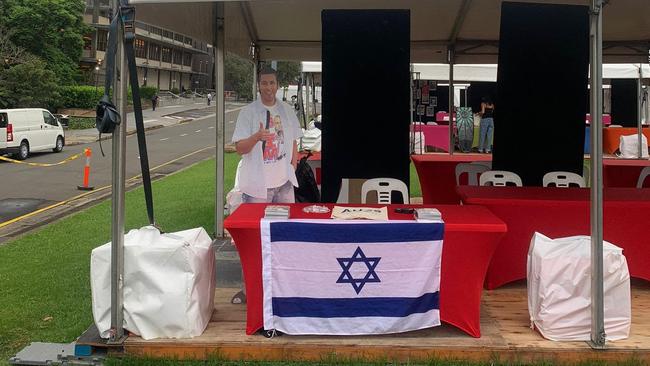Jewish students ‘uneasy’ for new year as Israeli flag torn down at Sydney University
The students felt ‘deeply unsafe’, an Australasian Union of Jewish Students member said.

Jewish university students across the country are “uneasy” about returning to campus and fear confrontations with well-organised pro-Palestinian student groups could increase this year, as a group of students at the University of Sydney was left feeling “deeply unsafe” following a clash on campus.
The Australasian Union of Jewish Students club at the University of Sydney confirmed that three students tore down an Israeli flag from their orientation week stall on Thursday – the first reported confrontation of the university year. Most schools return next week.
A University of Sydney spokesman said the university was “very concerned” by the reports and was “investigating as a matter of urgency”.
AUJS NSW co-president Michael Lionel Grenier said the students, to whom he had spoken, felt “deeply unsafe”.
“This was a physical incident. We’ve crossed the threshold into physical incidents, it borders on assault … At a political stall, (tearing down the flag) might be considered an act of political expression but as a stall of Jewish students, it might be considered a hate crime.”
Mr Grenier, who deferred his studies at the University of Sydney this year, said the university had “failed so gravely” in protecting Jewish students on campus: “The USYD executive and management have been negligent in their duties of protecting Jewish students.”
The University of Sydney spokesman said: “We strongly support the right of all our students to express their opinions and political views in a safe and legal way. We always take action if we are aware of an attempt to damage property, including when it would normally be seen as inhibiting another person’s right to free speech.”
AUJS president Noah Loven said “emotions were very high” and Jewish students were “very concerned about the potential for escalation and an increase in tensions on campus” in the new year.
Only a few weeks were left of official university classes when the October 7 massacre occurred, and Mr Loven said there were concerns pro-Palestinian university campaigners had time to organise for the year ahead.
He said AUJS, which had grown in membership since the Israel-Hamas conflict occurred, was training students in de-escalation, including warning students not be alone at o-week stalls and knowing phone numbers for campus security.
“Jewish students going back to university are feeling apprehension and unease and fear that potential incidents and altercations might occur. We’re here to provide a safe and welcoming place for students to celebrate their identity,” Mr Loven said.
“In the context of October 7 and the increase of anti-Semitism and what we see on campuses, many Jewish students who have never felt anti-Semitism or discrimination before are feeling very much uneasy and going back on campus for many Jewish students is going to be very difficult.”
Mr Loven said they had conveyed to university administrations across the country the need for the safety of every student.
“The line between freedom of speech and freedom of expression is very blurry at times, but if harm is caused to Jewish students, we expect the administration to take concerns very seriously and implement policy and procedures that protect Jewish students from harm,” he said.




To join the conversation, please log in. Don't have an account? Register
Join the conversation, you are commenting as Logout